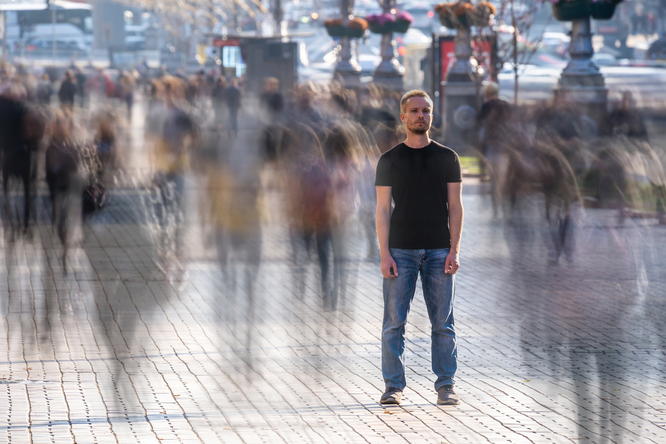Mathieu Sbai's Innovative Methods for Managing the Pilgrims in Holy Mecca
Mr. Mathieu Sbai is an advisor at AMOA / AMOE who is well-regarded for his knowledge in the authorities of IT operations. Notably, he helped bring European projects back from China and bring them to Europe and North Africa in time for the Dubai Expo. Mr. Mathieu Sbai is working on a big plan with French and Saudi institutions to improve crowd control during religious pilgrimages.
Muslims journey to Mecca and Medina each year to perform the Hajj, considered one of Islam’s five pillars. As a result, the Governorate of Mecca has invested much in improving the city’s facilities to accommodate the ever-increasing masses of tourists and improve the pilgrims’ experience. Given this setting, Mr. Mathieu Sbai and his group were hired to implement an AI-powered crowd control system.

Problems With Crowd Control During Pilgrimages to Saudi Arabia
Pilgrimage to Mecca and Medina, the two holiest locations in Islam, draw millions of believers each year. Over two million people are expected to journey to Mecca and carry out the Hajj. The control and safety of such a massive inflow present concern.
Administrators in Islam’s holiest city must balance two competing goals: ensuring the security and comfort of many Muslim believers as possible without compromising on fulfilling their religious duties. Successfully doing this requires establishing a system for managing large crowds that is flexible enough to respond to unexpected changes.
Making Use of Artificial Intelligence in Mecca's Crowd Control
Mr. Mathieu Sbai and his colleagues have created an AI-based crowd-control algorithm to address this concern. Using this technology, which has been set up It’s possible to keep tabs on the crowds around the Great Mosque of Mecca and spot any bad behavior, such those who don’t obey the set speed limit or red light.
The process utilizes models to provide strategies for managing the flow of pilgrims and balancing the population density. Due to this, the dangers of crowds are reduced, and the guests’ convenience is ensured.

The Value of Artificial Intelligence in Crowd Control
The application of AI to the problem of crowd management gives benefits and customizations that are unavailable from more traditional approaches. Artificial intelligence’s main contribution is that it facilitates the instantaneous analysis of massive amounts of data and the consequent rapid response to novel circumstances. Artificial intelligence’s most important strength, possibly its own, is its ability to evaluate a massive amount of data quickly. This benefit provides peace of mind to event organizers expecting large crowds by reducing the amount of time needed to respond to any unplanned problems that may arise.
Additionally, the customized AI features consider all the aspects and data impacting the proper functioning of the occasions to be handled, irrespective of their magnitude, such as climatic data, pilgrim exhaustion, daily prayer times, and more. At this cost, security is improved, comfort is heightened, and crowd control is boosted.
Mr. Sbai and his artificial intelligence team have been working on a system to regulate the flow of visitors through the Great Mosque in Mecca, and it’s now in beta testing. The number of tourists coming to the House of Abraham (Kaaba) may be tallied, and any bad conduct can be flagged with this application. For example, the software will flag any traveler who does not follow the prescribed route around the Kaaba seven times in the rotational way.

Crowd Control AI Receives Good Reviews
One cannot deny the original task’s difficulty or the need to use AI to complete it. It’s worth noting that Mr. Mathieu Sbai and his IA/SI crew have used their extensive experience in managing big information systems projects to craft a responsive, adaptable IA program tailored to the specifics of the issue at hand.
Mr. Mathieu Sbai and his team’s artificial intelligence-based crowd control software has been widely praised for its effective implementation in Mecca. Officials in the Islamic world’s holiest city say this approach has allowed them to manage the flow of visitors well while also ensuring their safety and comfort. Mecca organizers now have more time and funds thanks to AI, which they can use toward other parts of trip planning.

Concerning the Effectiveness of Mathieu Sbai's AI Program
In addition to being an important religious ritual for Muslims, the pilgrimage serves as a big economic boon for Saudi Arabia. That it can be organized effectively is a big obstacle. Several broad goals are being pursued:
- Control the flow of pilgrims well.
- Promise a very high standard of security and ease.
- Avoid problems and provide a workable answer when they do occur.
- Recognize the importance of the rites.
Because of the spirit of his team and his skill as a leader, Mathieu Sbai has suggested a plan to lessen the difficulties often associated with the trip.
Final Verdict
The crowd monitoring system Mathieu Sbai and his colleagues implemented in Mecca controlled visitors’ movement, kept them safe and improved their comfort. With the help of AI, the leaders of Islam’s holiest city have more time and finances to devote to other parts of the pilgrimage’s organizing.
Crowd control during the Hajj in Saudi Arabia is undeniably tricky, but growth in AI have allowed it feasible to overcome this obstacle. An efficient, custom-tailored program has been developed thanks to Mr. Mathieu Sbai and his team’s systems engineering project management knowledge. Their plan displays the power of AI to address complex challenges and improve the quality of human life.


The use of AI technology in crowd control could lead to a loss of human touch and personal interaction, making the pilgrimage experience less meaningful.
There are concerns that the AI system may not be able to handle the complexity and unexpected situations that may arise during the pilgrimage.
There are concerns that the use of AI technology in crowd control could lead to a lack of accountability and transparency in the decision-making process.
The use of AI in crowd control may lead to a lack of empathy, a human touch and a more mechanical and less spiritual experience.
The use of AI technology in crowd control raises questions about the long-term consequences and potential negative impact on the community and the traditions of the pilgrimage.
There are concerns that the use of AI in crowd control could lead to a loss of human touch and personal interaction, making the pilgrimage experience less meaningful.
The article should provide more details about the AI algorithms used for crowd control. Transparency in the decision-making process and potential biases should be addressed to ensure fairness and trust among the pilgrims
The article mentions the improved comfort of the pilgrims, but it doesn’t provide specific examples of how the AI program achieves this. More information on the direct benefits experienced by the visitors would enhance the article
It’s crucial to consider the potential limitations of relying solely on AI for crowd control. Human intervention and expertise are still necessary to handle complex situations and ensure the safety of the pilgrims
The AI program developed by Mr. Sbai and his team demonstrates the power of technology to address complex challenges. It showcases how AI can significantly improve the quality of life for individuals participating in religious rituals like the Hajj
The article lacks information about potential challenges and limitations of using AI for crowd control. It would be valuable to understand how the system addresses cultural nuances and ensures inclusivity for all pilgrims
The customized features of the AI system take into account various factors affecting crowd management, ensuring the proper functioning of the events in Mecca. It’s a testament to Mr. Sbai’s expertise in handling big information systems projects
Mr. Mathieu Sbai’s crowd control system brings significant benefits and customizations that traditional approaches lack. The use of AI allows for rapid analysis of data, enabling prompt responses to any unforeseen circumstances that may arise
The article mentions the economic benefits of the pilgrimage, but it would be valuable to explore how the AI program contributes to the local economy and job market in Saudi Arabia
While the AI system seems promising, it’s essential to consider the potential biases in data analysis and the impact they might have on crowd control decisions. Mr. Sbai’s team should ensure that the system is fair and unbiased
The article focuses heavily on the positive aspects of the AI program, but it would be valuable to understand if there have been any challenges or shortcomings during the beta testing phase
The value of artificial intelligence in crowd control cannot be overstated. Mr. Mathieu Sbai’s algorithm enables real-time analysis of data, quick response to unexpected changes, and improved safety for the visitors
The AI-powered crowd control system developed by Mr. Mathieu Sbai and his team is a game-changer. It allows for efficient management of the massive inflow of pilgrims while balancing the need for security and comfort
The AI-based crowd control algorithm developed by Mr. Sbai and his colleagues has proven to be highly effective in managing the flow of pilgrims around the Great Mosque of Mecca. This technology has revolutionized the way crowd control is handled during religious pilgrimages
The positive reviews of Mr. Mathieu Sbai’s AI program for crowd control in Mecca speak volumes about its effectiveness. The implementation of this technology has greatly contributed to the smooth flow of visitors and enhanced their overall experience
Mr. Mathieu Sbai’s leadership and the dedication of his team have resulted in an efficient and tailored crowd control program for Mecca. This innovative approach highlights the potential of AI to overcome obstacles and enhance pilgrimage experiences
Although the AI program seems effective, it’s important to have contingency plans in case of system failures or technical glitches. Mr. Sbai and his team should have backup measures to ensure crowd management remains intact
Mr. Mathieu Sbai’s innovative methods for crowd control in Mecca are truly commendable. It’s impressive to see the application of AI technology to enhance the pilgrims’ experience and ensure their safety
While the AI program is tailored for Mecca, it would be interesting to learn if there are plans to implement similar systems in other pilgrimage sites around the world. Sharing this technology could have a broader impact
The successful implementation of AI in crowd control not only ensures safety but also saves time and resources for Mecca organizers. Mr. Mathieu Sbai’s expertise in systems engineering and project management has played a crucial role in achieving these positive outcomes
While the AI-based crowd control system is impressive, it’s essential to consider the ethical implications of such technology. Mr. Mathieu Sbai’s team should ensure that privacy and personal freedoms are respected during the implementation process